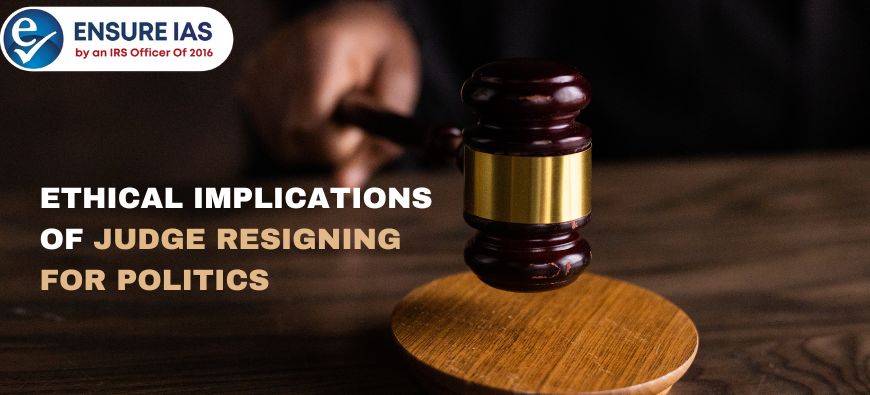- Courses
- GS Full Course 1 Year
- GS Full Course 2 Year
- GS Full Course 3 Year
- GS Full Course Till Selection
- Answer Alpha: Mains 2025 Mentorship
- MEP (Mains Enrichment Programme) Data, Facts
- Essay Target – 150+ Marks
- Online Program
- GS Recorded Course
- Polity
- Geography
- Economy
- Ancient, Medieval and Art & Culture AMAC
- Modern India, Post Independence & World History
- Environment
- Governance
- Science & Technology
- International Relations and Internal Security
- Disaster Management
- Ethics
- NCERT Current Affairs
- Indian Society and Social Issue
- NCERT- Science and Technology
- NCERT - Geography
- NCERT - Ancient History
- NCERT- World History
- NCERT Modern History
- CSAT
- 5 LAYERED ARJUNA Mentorship
- Public Administration Optional
- ABOUT US
- OUR TOPPERS
- TEST SERIES
- FREE STUDY MATERIAL
- VIDEOS
- CONTACT US
Ethical Implications of Judge Resigning for Politics
Ethical Implications of Judge Resigning for Politics
03-05-2024

In March 2024, Justice Abhijit Gangopadhyay, , left his position as a judge in the Calcutta High Court and joined the Bharatiya Janata Party (BJP).
- His move from the judiciary to politics raises significant ethical concerns regarding judicial propriety (decorum/decency), impartiality, and integrity.
- Mr. Gangopadhyay gained attention for various controversial actions:
- He criticized the West Bengal government and discussed the school bribery case in a TV interview.
- He had disagreements with lawyers and fellow judges.
- Regarding Mr. Gangopadhyay's behavior, a bench led by CJI D.Y. Chandrachud and Justice P.S. Narasimha rightly stated that judges shouldn't give TV interviews on pending matters.
|
Judges in Politics
|
Constitutional Debate on Judges Conduct and Joining Politics:
|
Against Joining Politics |
In Favor of Joining Politics |
|
|
Constitutional Provisions on Judges' Powers and Privileges
- Judicial privilege is necessary to keep judicial decision-making confidential.
- The constitutional basis for this comes from the separation of powers and maintaining the independence of the judiciary.
- Removal of Judges: Judges can be removed through impeachment by Parliament according to Article 217 and Article 124(4) of the Indian Constitution.
- Contempt Power: Article 215 states that High Courts have contempt power as courts of record, which judges can enforce.
Ethical Concerns Regarding a Judge's Resignation for Politics
-
Judicial Impartiality:
- Judges should stay neutral and base decisions solely on facts and law, without personal biases or external pressures.
- When a sitting judge joins a political party after controversies, it raises doubts about impartiality in cases involving politics.
- This damages public trust in the judiciary's fairness.
- Judges are required by Article 124 of the Indian Constitution to perform their duties without fear, favor, affection, or ill-will.
-
Judicial Independence:
- Judicial independence is vital for upholding the rule of law and democracy.
- Judges must be free from outside influence, including politics.
- If a judge aligns with a political party post-resignation, it questions the independence of past decisions and raises concerns about political influence on the judiciary.
-
Conflict of Interest:
- Judges should avoid conflicts of interest and maintain judicial integrity.
- Involvement in politics after controversial rulings suggests potential conflicts of interest.
- Erosion of Public Trust:
- The judiciary relies on public trust and confidence to fulfil its role in society.
- When judges get involved in political activities, it undermines the perception of judicial integrity and impartiality, leading to erosion of public trust in the entire judicial system.
- In C. Ravichandran Iyer vs Justice A.M. Bhattacharjee, 1995, the SC stressed about judges possessing ‘sterling (excellent) character, impeccable (perfect) integrity, and upright behaviour’ to maintain the purity of justice.
- In All India Judges’ Association vs Union of India, 1991, the Supreme Court highlighted society's expectations from judicial officers, which are compromised when judges engage in political activities.
-
Against the Principle of Checks & Balances:
- The Constitution emphasizes checks and balances among its branches.
- An independent judiciary oversees the actions of the executive and legislature.
-
Violation of Bangalore Principles of Judicial Conduct, 2002:
- The Bangalore Principles stress maintaining public and professional confidence in judges' impartiality.
- Political involvement, especially after making controversial statements during service, may violate these principles.
- Judges entering politics, especially after controversial rulings, raise concerns about conflicts of interest.
- Judges are expected to avoid such conflicts and uphold their integrity.
-
Issue of Post-Retirement Appointments:
- Some retired judges have taken up government positions after retirement, blurring the line between the judiciary and the executive.
- The Indian Constitution doesn't expressly stops judges from accepting post-retirement assignments, but there are suggestions for implementing a cooling-off period to reduce potential conflicts of interest.
- Concerns Raised: Late Arun Jaitley, a former Union Minister, suggested that judgments made before retirement may be influenced by post-retirement opportunities.
- Historical Perspective: The 14th Law Commission Report in 1958 highlighted concerns and recommended a system to ensure judges' financial security without compromising their independence.
- Proposals for Cooling-Off Period: Former Chief Justice of India (CJI) R. M. Lodha recommended a cooling-off period of at least 2 years.
- Officials retiring from sensitive positions should be prohibited from accepting any other appointment for a certain period, typically two years.
- Rationale Behind Cooling-Off Periods: These periods aim to break the link between previous roles and new appointments by introducing a significant time gap.
- International Practices: In the USA, Supreme Court justices hold lifetime positions to prevent conflicts of interest.
- In the UK, although there's no law preventing judges from taking post-retirement jobs, no judge has done so, indicating a different approach to the issue of post-retirement roles.



